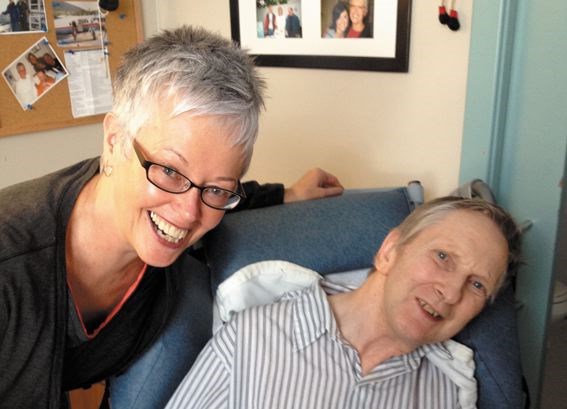When Bill Kilbey met Valerie in 1973, he told her kids were out of the question.
He was yet to be diagnosed with Huntington's Disease, but Kilbey knew the degenerative brain disorder ran in his family.
He refused to pass it on, having watched it attack his own father's mental faculties, shifting his moods and slowly limiting his mobility.
That conversation happened just a few dates in.
But before that he said, "I'm falling in love with you, but you need to know that this could happen to me and if you're not willing to go through that, that's fine," said Kyra Sienaert, Bill and Valerie's 31-year-old daughter.
Bill Kilbey, a well known Prince George teacher, coach and counsellor, died April 24, 2014 at age 65.
Sienaert was a surprise opportunity for the couple that seized what life together they could, knowing their time together would be shorter than some relationships. Even so, they were together more than 40 years. They took two-and-a-half years off to travel the world. And when medical progress made sperm donation a possibility, they leapt at that too.
"My mother and my father had a love story that still to this day I can't really even fathom," said Sienaert, who was 14 when Kilbey was diagnosed at age 49.
"His whole life revolved around my mother and I. We were three peas in a pod."
An avid athlete, Kilbey coached his daughter when she was young.
"He was my best friend," said Sienaert. "He always was just there, he was a constant person in my life that played a huge role in the person that I am now."
It's one of the many reasons Sienaert has planned a memorial golf tournament in his name.
Set for Sept. 26, the Sacred Heart School teacher will donate all funds to her school's library.
He was a role model to her and others, she said, but not an obvious one.
"He did it from the shadows a little bit," said Sienaert of Kilbey, who retired soon after he was diagnosed. "He was very humble so everything he did wasn't for the benefit of himself, he just was really giving that way.
"That's why I think that there's been such amazing feedback from this tournament so far is because nobody really expected it. He didn't take any kind of credit for anything and so to have something happening in his name would totally kind of catch him off guard."
She'd also like people to know more about Huntington's - most people she speaks have very little understanding of the disease.
"The end result was a lot of Alzheimer's kind of symptoms," she explained. "Huntington's Disease eats what's called the your caudate of your brain. It actually eats big holes out of their brain."
"The caudate is kind of like the traffic controller of your brain," she said, and over time that controller can no longer command the body to do the most basic of functions.
"They call it one of the most personal disease in the world," she said, because the symptoms can be so drastically different for people.
For her father, the first five years brought forgetfulness, confusion, and loss of bladder and bowel control.
By her sixteenth birthday, he struggled to form the four letters of her name on her card.
"The first part (of the disease) was harder than the last part which is bizarre in a way because he was so debilitated by the end," said Sienaert, but she was young and angry that this was happening to her father.
When she speaks of him, the admiration is evident.
"My dad was kind and he was fair and honest and he was positive," Sienaert said.
Even as the disease progressed, Kilbey continually echoed the same refrain: "I'm okay. I'm okay. I'm okay."
"That's just how he was. He just was good. And even despite having this awful thing happen to him, he just was fine."
Until the end, even though he couldn't voice their names, he knew who she and her mother were. Three peas in a pod.
"If my mom walked into a room his face would light up, still two or three days before he died."
Sienaert sees the last chapter of Kilbey's life from 2008 on, after he fell and couldn't get back up.
"Overnight he couldn't stand up anymore," said Sienaert, whose mother kept him at their Prince George home as long as possible even as she worked full time as a librarian at Prince George Secondary School.
"My mother's my hero," she said.
After a few months at the University Hospital of Northern British Columbia waiting for a bed, he got a spot at Simon Fraser Lodge, where he stayed until he died of pneumonia.
The last years were tough.
"We knew that he was really ready to die because about two years before he started to die, when you asked him how he was doing... he would kind of mutter under his breath as best he could, 'I've got Huntington's. I've got Huntington's.' It wasn't an honourable way to die. It was awful to watch his whole body shut down but that was just his life."
And one of the legacies of that life is how she lives hers - with the "sure can" attitude that was so unique to her father's personality.
"I'm always going to say yes because I learned from him and watching him, that life is just way too short," she said.
The nine-hole golf tournament is on Sept. 26 at the Prince George Golf and Curling Club starting at 12:30 p.m. It's $90 to register a team and can be done in-person at the Spruce Credit Union or the Sacred Heart School office, by phone 250-981-3865 or by email at [email protected].



